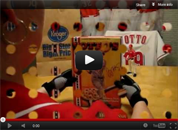Non-Baseball Stuff
David “Homer” Dewitt Bailey Jr. was born May 3, 1986, in La Grange, Texas. Reds fans have been drooling over visages of Baily in the minors with his shoulder-length brown hair, but he cut it much shorter for his major league debut on June 8, 2007. He looks much better with his hair short.
Homer's father, David, mother, and sisters, Jessica and Crystal, were in the stands for his debut against the Indians. They're about as easy-going and quintessentially Texan as you can imagine. No wonder he handles pressure well.
Homer's called “Homer” instead of David after his great-grandfather. His mother said that she liked for her husband and son to go by different names so that they couldn't pretend that she was talking to the other one when she called.
Homer graduated from La Grange (TX) High School in 2004. As a freshman, he outdueled former Red Ryan Wagner in the championship game, which we hope is foreshadowing of his level of success compared to Wagner's.
Since my rephrasing wouldn't be better than what's already here, I'll just quote this bit:
The 6-foot-4, 205-pounder headed the USA Today 2004 All-USA High School baseball team — his high school stats were staggering. He was 15-0, 0.68 ERA, and 201 strikeouts in 92 2/3 innings as a senior, and 41-4, 0.98 ERA, & 536 strikeouts in 298 innings in his entire high school career. According to USA Today columnist Chris Hartzell, “Homer is clearly better than his boyhood idol Roger Clemens”.


